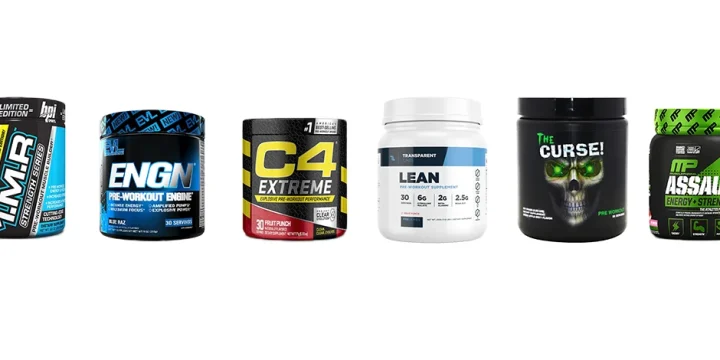Having talked with many colleagues, I’ve noticed that quite a few of them advice magnesium to the patients for their training sessions.
I’ve never personally advised magnesium as a fitness supplement, so I wanted to check if it could have some substance as a pre-workout.
For this reason, I collaborated with a team of dietitians to establish the role of magnesium as a pre-workout.
In the guide below, I’ll share my results.
Quick Summary
- Magnesium is a good pre-workout supplement as it aids in muscle contraction, energy production, and can enhance overall exercise performance.
- Supplementing with magnesium can significantly reduce post-workout muscle soreness and aid in quicker recovery.
- Athletes may experience up to a 20% loss of magnesium during training or competition, highlighting the importance of magnesium replenishment.
- In my opinion, it's clever to consider magnesium supplementation for a well-rounded pre-workout routine, given its multiple benefits in improving exercise performance and muscle recovery.
4 Reasons Why Magnesium Is Important for Exercise

Magnesium is key for exercise, impacting muscle contraction, relaxation, and strength [1]. When training, your body uses magnesium quickly, especially during intense workouts [2]. It aids in muscle movement, oxygen flow, and clearing lactic acid from muscles.
Crucially, magnesium helps muscle recovery by boosting protein synthesis and reducing muscle inflammation, as shown in "Effects of Magnesium Supplementation on Muscle Soreness and Performance" in the Journal of Strength and Conditioning Research [3].
Since starting advice magnesium supplements to my patients, I've seen a noticeable boost in their exercise performance. It's been great for glucose metabolism, keeping their blood, muscles, and brain well-supplied during tough training.
So, here are four big reasons to consider magnesium supplements for your fitness regime.
1. Magnesium Boosts Energy Levels
The synthesis of ATP requires magnesium-dependent enzymes, which are needed for efficient hydration.
2. Reduces Post-Workouts Aches and Pains

One of my patient told me, that before magnesium supplements, his muscles were so sore and stiff he had skip workouts for days, even a week. He tried everything - self-massage, hot yoga, ice, warm baths - but nothing worked.
Magnesium, however, has been a game-changer, significantly reducing my DOMS (Delayed Onset Muscle Soreness) [5].
Workouts often cause lactic acid build-up, leading to soreness. A little soreness feels good, but too much hampers movement the next day.
Magnesium aids in muscle relaxation, preventing cramps and twitching. It regulates muscle contractions and boosts glucose availability.
Additionally, it interacts with calcium, crucial in preventing muscle pain, as detailed in the European Journal of Biochemistry [6].
3. Magnesium Supplements Help with Sleep
Magnesium can enhance sleep by regulating neurotransmitters linked to sleep [7]. These neurotransmitters are vital for activating relaxation and calming mechanisms in your nervous system.
My patients take magnesium supplementation for sleep and haven’t experienced any sleeping problems.
Previously, post-workout nights were restless for them, waking up and struggling to fall back asleep. Now, magnesium has almost completely resolved this, improving their sleep quality and, in turn, their physical performance.
4. Magnesium Helps with Stress Management

Magnesium, known for its calming effect on nerves, helps relax muscles and alleviate post-workout irritability.
According to the book "Magnesium in the Central Nervous System", taking muscle supplements makes you feel more relaxed, allows better sleep, and provides more energy [8].
What are the Signs of Magnesium Deficiency?

The signs of magnesium deficiency include loss of appetite, low energy levels, fatigue, muscle weakness, and nausea. As the symptoms worsen, numbness, irregular muscle contractions (spasm), and abnormal heart rate rhythm can occur.
Other signs and symptoms of magnesium deficiency include:
- Marginal magnesium deficiency imparts the workout muscle performance and will amplify the negative consequences of intense physical exercise.
For example, without sufficient magnesium levels, your body switches to anaerobic metabolism. This allows the build-up of lactic acid, which is usually associated with muscle soreness and spasms [9]:
- A magnesium deficiency can also lead to muscle and nerve cramps and shin splints, especially after the workouts. It impedes the recovery period and makes you susceptible to injuries.
- Chronic deficiencies in magnesium are also implicated in reduced bone health. Remember, nearly half of the body's magnesium is stored in the bone and is essential for bone health.
- Inadequate intake is associated with bone disorders such as osteoporosis, anemia, and bone loss.
Magnesium deficiency effects are pronounced in athletes due to increased sweat and urine production during exercise.
Depending on the intensity of the exercises, athletes may experience losses of up to 20%, according to the research "Update on the relationship between magnesium and exercise" published in PubMed [10].
Athletes who are particularly at a greater risk for magnesium deficiency are those practicing restrictive dieting or those who cut calories for weight loss.
What’s the Best Way to Top Up Your Magnesium?

Boosting my patient's magnesium levels transformed their workouts and energy. Key to this was eating unrefined whole grains like wholemeal bread and pumpkin seeds.
Magnesium is found in both plant and animal foods. Other sources include green leafy veggies (spinach, cabbage, broccoli), nuts, peas, seeds, lentils, dietary fiber-rich foods (dark chocolate, tofu, seeds, whole grains), and various types of water, though levels vary by source and brand. Surprisingly, milk and dairy aren't magnesium-rich.
Remember, magnesium is soluble, so boiling vegetables can lead to mineral loss. In cereals and grains, magnesium is mainly in the germ and bran, making unrefined grains richer in magnesium than their refined counterparts.
FAQs
Is It Good To Take Magnesium Before A Workout?
Yes, it’s good to take magnesium before a workout, especially if you’ll be performing high-intensity workouts. Magnesium is necessary for pre-workout because it improves muscle function and exercise performance in the long term.
Is Magnesium Good For Building Muscle?
Magnesium is good for building muscles because it's used in just about everything in your body for an effective exercise and muscle build-up.
What Happens When You Start Taking Magnesium?
When you start taking magnesium, you'll notice an improvement in several health markers such as blood pressure and blood sugar. Continual magnesium usage will reduce certain health conditions such as migraines, depression, and disease.
Does Magnesium Help With Weight Lifting?
Yes, magnesium helps with weight lifting by contributing to the body's flexibility and preventing injuries by loosening the tight muscles. Without sufficient magnesium levels in your body, the muscles won't relax and may lead to muscle cramps when weight lifting.
Should I Take Calcium With Magnesium?
Yes, you can take calcium with magnesium supplements, but it’s important to maintain a healthy ratio to keep your body functioning at its best. I'd recommend you seek guidance from your healthcare provider as both can interfere with one another's absorption.
References:
- https://www.ncbi.nlm.nih.gov/pmc/articles/PMC2669297/
- https://www.ncbi.nlm.nih.gov/books/NBK236242/
- https://journals.lww.com/nsca-jscr/abstract/2022/08000/effects_of_magnesium_supplementation_on_muscle.19.aspx
- https://www.acs.org/molecule-of-the-week/archive/a/adenosine-triphosphate.html
- https://pubmed.ncbi.nlm.nih.gov/12617692/
- https://febs.onlinelibrary.wiley.com/doi/abs/10.1111/j.1432-1033.1994.tb18836.x
- https://www.sleepfoundation.org/magnesium
- https://www.jstor.org/stable/10.20851/j.ctt1t3055m.23
- https://www.sciencedirect.com/topics/medicine-and-dentistry/anaerobic-metabolism
- https://pubmed.ncbi.nlm.nih.gov/17172008/
About The Author
You May Also Like






